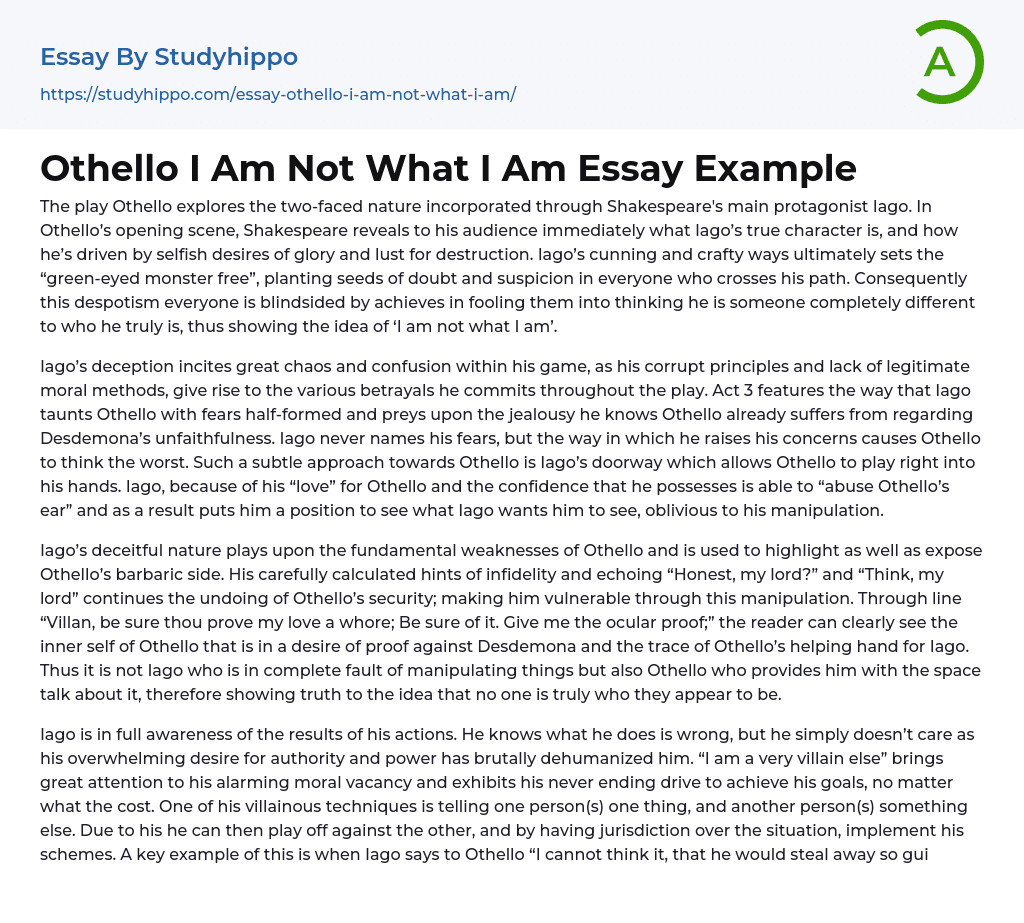The play Othello explores the two-faced nature incorporated through Shakespeare's main protagonist Iago. In Othello’s opening scene, Shakespeare reveals to his audience immediately what Iago’s true character is, and how he’s driven by selfish desires of glory and lust for destruction. Iago’s cunning and crafty ways ultimately sets the “green-eyed monster free”, planting seeds of doubt and suspicion in everyone who crosses his path. Consequently this despotism everyone is blindsided by achieves in fooling them into thinking he is someone completely different to who he truly is, thus showing the idea of ‘I am not what I am’.
Iago’s deception incites great chaos and confusion within his game, as his corrupt principles and lack of legitimate moral methods, give rise to the various betrayals he commits throughout the play.
...Act 3 features the way that Iago taunts Othello with fears half-formed and preys upon the jealousy he knows Othello already suffers from regarding Desdemona’s unfaithfulness. Iago never names his fears, but the way in which he raises his concerns causes Othello to think the worst. Such a subtle approach towards Othello is Iago’s doorway which allows Othello to play right into his hands. Iago, because of his “love” for Othello and the confidence that he possesses is able to “abuse Othello’s ear” and as a result puts him a position to see what Iago wants him to see, oblivious to his manipulation.
Iago’s deceitful nature plays upon the fundamental weaknesses of Othello and is used to highlight as well as expose Othello’s barbaric side. His carefully calculated hints of infidelity and echoing “Honest, my lord?” and “Think, my lord” continues the
undoing of Othello’s security; making him vulnerable through this manipulation. Through line “Villan, be sure thou prove my love a whore; Be sure of it. Give me the ocular proof;” the reader can clearly see the inner self of Othello that is in a desire of proof against Desdemona and the trace of Othello’s helping hand for Iago. Thus it is not Iago who is in complete fault of manipulating things but also Othello who provides him with the space talk about it, therefore showing truth to the idea that no one is truly who they appear to be.
Iago is in full awareness of the results of his actions. He knows what he does is wrong, but he simply doesn’t care as his overwhelming desire for authority and power has brutally dehumanized him. “I am a very villain else” brings great attention to his alarming moral vacancy and exhibits his never ending drive to achieve his goals, no matter what the cost. One of his villainous techniques is telling one person(s) one thing, and another person(s) something else. Due to his he can then play off against the other, and by having jurisdiction over the situation, implement his schemes. A key example of this is when Iago says to Othello “I cannot think it, that he would steal away so guilty like, seeing your coming”. The fact that Iago says “I cannot think it” makes it sound as if Cassio has committed some terrible deed, and because of this overly dramatic, ambiguous line, it formulates an important threat to Othello, and consequently assists in aiding Iago’s plan; putting him in control.
The
idea of ‘I am not what I am’ is best exercised through lines “I protest, in the sincerity of love and honest kindness” and “good god, the should of all my tribe defend from jealousy” This blatant irony depicted numerous times throughout the play displays how utterly oblivious the characters are and how Iago is constantly one step ahead of the game his manufactured. It’s evident that he has suffocated everyone within his wickedness that they are blind the facade he has disguised himself with. Conformation of this is shown through lines “O that’s an honest fellow” and “Goodnight, honest Iago”, thus proving the extent to which Iago has managed to deceive everyone.
Ultimately, in being desensitized to the suffering of others, Iago is under the illusion that he is emotionally invincible and immune to a guilty conscious. Shakespeare is implying that it is the state of being emotionally barren and detached from reality that may just eventually break us. Iago’s obsessive lust for power and advancement contributes to the destructive effect of turning him into the epitome of a villain, whose sheer hatred and lack of morals in the attempt to fulfill his desires brings on his own self destruction and a life lived in constant fabrication.
- Othello Jealousy essays
- A Doll's House essays
- A Midsummer Night's Dream essays
- A raisin in the sun essays
- A Streetcar Named Desire essays
- An Inspector Calls essays
- Death of a salesman essays
- Everyman essays
- Fences essays
- Hamlet essays
- Hedda Gabler essays
- Iago essays
- King Lear essays
- Macbeth essays
- Much ado about nothing essays
- Oedipus Rex essays
- Oedipus The King essays
- Othello essays
- Pygmalion essays
- Romeo And Juliet essays
- Tartuffe essays
- The glass menagerie essays
- The Importance of Being Earnest essays
- The Merchant Of Venice essays
- The Taming of The Shrew essays
- Twelfth Night essays
- Waiting For Godot essays




